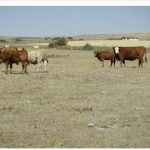Although details were scarce in most cases, the May 2 federal budget promised $1.5 billion in new agricultural funding this year, as well as hundreds of millions of dollars for rural infrastructure spending and a budget boost for the Canadian Food Inspection Agency.
According to agriculture minister Chuck Strahl, details of the new spending will be announced in the weeks ahead.
However, he said most of the new money will be delivered through:
- A retroactive change to the Canadian Agricultural Income Stabilization program to amend the way on-farm inventory is valued when CAIS applications are made. Cattle producers who saw herd values devastated by BSE could be the biggest beneficiaries.
Read Also

Land crash warning rejected
A technical analyst believes that Saskatchewan land values could be due for a correction, but land owners and FCC say supply/demand fundamentals drive land prices – not mathematical models
The change is retroactive to the beginning of CAIS in 2003 and the federal government will pick up all additional claims for the first three years. During the next two years, claims will be shared under the traditional 60-40 federal-provincial formula.
An Agriculture Canada official said the likely change would be to compare market prices and inventory volumes at the beginning of each year and at the end of the year to get an accurate estimate on value change.
- Improved negative margin coverage to allow two years of losses to be included in the reference margin formula.
- A one-time program to help low income farm families get up to a minimum income level that will be established by the government. The program is expected to be based on income tax returns.
- A cover crop program to help flooded farmers.
- An increase in money available through the spring cash advance program, once legislation is approved.
- A program to encourage development of an ethanol and biofuel industry, likely to be announced this spring.
- Spending on market development.
The government also promised $1.5 billion over the next four years on municipal rural infrastructure spending.
It will also send $195 million over five years to the Canadian Food Inspection Agency to help combat avian influenza.
















